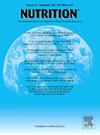Vitamin B12 supplementation attenuates endoplasmic reticulum stress and neuronal cell death in the cerebral cortex of high-fat high-sucrose-fed male mice
IF 3.2
3区 医学
Q2 NUTRITION & DIETETICS
引用次数: 0
Abstract
Introduction
Increased consumption of a high-calorie diet results in the development of metabolic disorders and associated neurological impairments, ultimately leading to cognitive decline. Metabolic disturbances such as hyperglycaemia, systemic insulin resistance, and hyperhomocysteinemia (HHcy) are linked to neurodegenerative diseases. These conditions share a common pathogenic feature of increased susceptibility to protein misfolding and aggregation, which triggers endoplasmic reticulum (ER) stress. Vitamin B12 is vital for brain health, and its deficiency is associated with HHcy and ER stress. This study investigated the effect of vitamin B12 supplementation on diet-induced metabolic disorder-associated ER stress and neurobehavioral outcomes in mice.
Methods
Two-month-old C57BL/6J male mice were randomly assigned to three groups and fed with respective diets for 8 months: Control (C) group (B12: 25 μg/kg diet), HFHS (high-fat, high-sucrose diet; B12: 25 μg/kg), and HFHS+B12 (B12: 50 μg/kg).
Results
Fasting blood glucose, glucose tolerance, triglycerides, and total cholesterol were similar across all groups. The HFHS diet led to body weight gain, higher insulin levels, elevated homocysteine (Hcy), and HOMA-IR compared to C group. However, B12 supplementation to HFHS mice significantly reduced Hcy levels compared to HFHS group. Additionally, the HFHS diet resulted in ER stress, neuronal apoptosis and astrogliosis in the cerebral cortex. However, B12 supplementation to HFHS group mitigated ER stress, protected against neuronal cell death, and reduced astrogliosis. Moreover, B12 supplementation enhanced neurotrophic support and reduced anxiety-like behaviour in HFHS+B12 group.
Conclusions
Overall, these findings suggest that B12 supplementation confers protection against Hcy-induced ER stress and apoptosis, highlighting its potential as a neuroprotective agent.
补充维生素B12可减轻高脂高糖雄性小鼠大脑皮层内质网应激和神经元细胞死亡
高热量饮食的增加会导致代谢紊乱和相关的神经损伤,最终导致认知能力下降。代谢紊乱,如高血糖、全身胰岛素抵抗和高同型半胱氨酸血症(HHcy)与神经退行性疾病有关。这些疾病都有一个共同的致病特征,即对蛋白质错误折叠和聚集的易感性增加,从而引发内质网(ER)应激。维生素B12对大脑健康至关重要,缺乏维生素B12与HHcy和内质网应激有关。本研究探讨了补充维生素B12对小鼠饮食诱导的代谢紊乱相关内质网应激和神经行为结果的影响。方法将2月龄C57BL/6J雄性小鼠随机分为3组,分别饲喂8个月的饲粮:对照组(C)组(维生素B12: 25 μg/kg饲粮)、HFHS(高脂高糖饲粮;B12: 25 μg/kg), HFHS+B12 (B12: 50 μg/kg)。结果各组空腹血糖、葡萄糖耐量、甘油三酯和总胆固醇相似。与C组相比,HFHS饮食导致体重增加,胰岛素水平升高,高同型半胱氨酸(Hcy)和HOMA-IR升高。然而,与HFHS组相比,HFHS小鼠补充B12可显著降低Hcy水平。此外,HFHS饮食导致内质网应激,大脑皮层神经元凋亡和星形胶质细胞形成。然而,HFHS组补充B12可减轻内质网应激,防止神经元细胞死亡,并减少星形胶质细胞增生。此外,补充B12可增强HFHS+B12组的神经营养支持并减少焦虑样行为。总之,这些研究结果表明,补充B12对hcy诱导的内质网应激和细胞凋亡具有保护作用,突出了其作为神经保护剂的潜力。
本文章由计算机程序翻译,如有差异,请以英文原文为准。
求助全文
约1分钟内获得全文
求助全文
来源期刊

Nutrition
医学-营养学
CiteScore
7.80
自引率
2.30%
发文量
300
审稿时长
60 days
期刊介绍:
Nutrition has an open access mirror journal Nutrition: X, sharing the same aims and scope, editorial team, submission system and rigorous peer review.
Founded by Michael M. Meguid in the early 1980''s, Nutrition presents advances in nutrition research and science, informs its readers on new and advancing technologies and data in clinical nutrition practice, encourages the application of outcomes research and meta-analyses to problems in patient-related nutrition; and seeks to help clarify and set the research, policy and practice agenda for nutrition science to enhance human well-being in the years ahead.
 求助内容:
求助内容: 应助结果提醒方式:
应助结果提醒方式:


